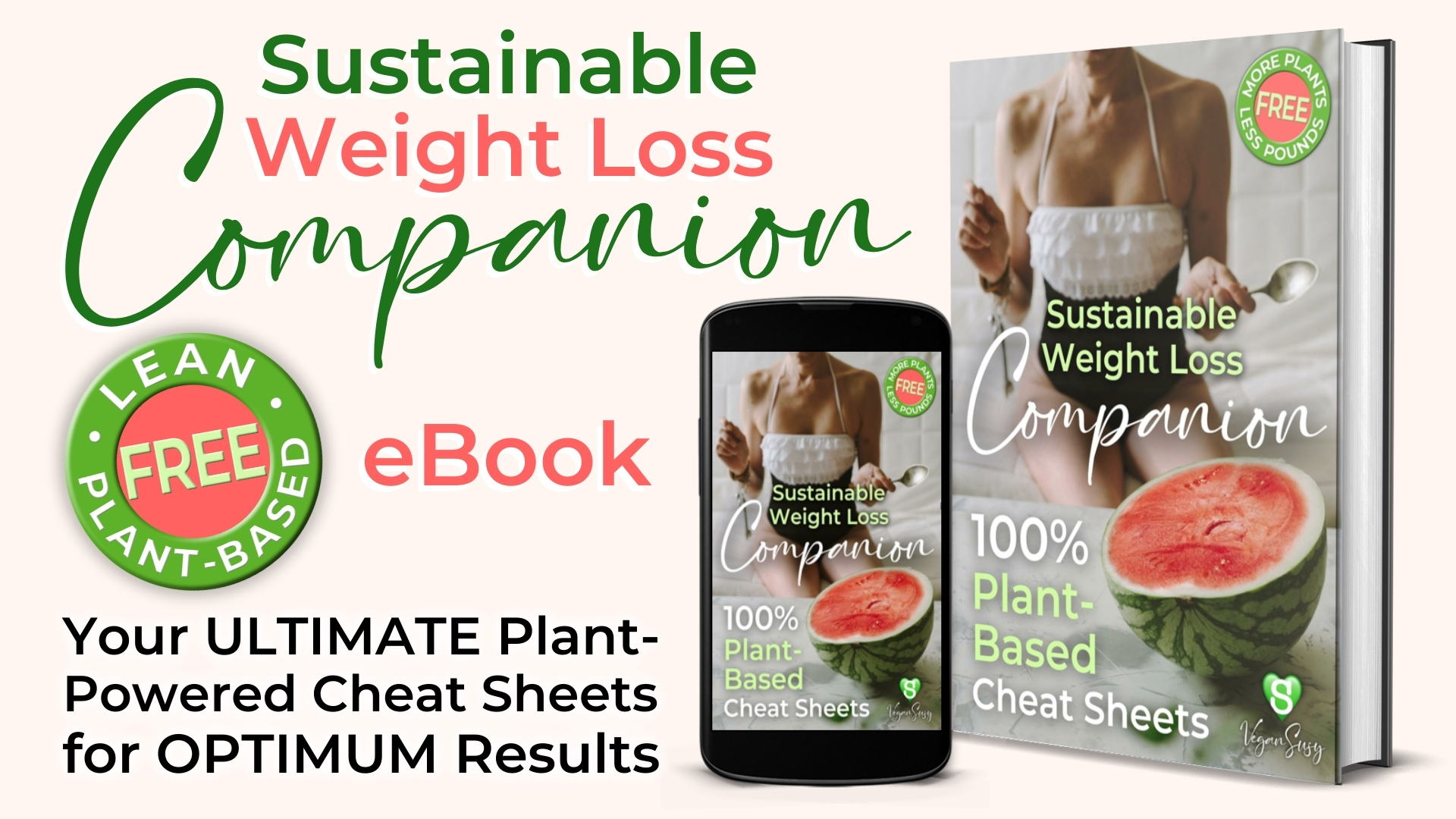
Frequently Asked Questions
Frequently Asked Questions About Plant-Based Weight Loss
Is it normal to feel full but still hungry on a plant-based diet?
At first, absolutely! When you embark on the journey of a plant-based lifestyle, your body needs time to adapt to the digestion of fibre-rich and nutrient-dense foods. Initially, you may experience more frequent hunger pangs as your body adjusts. If you're feeling hungry, honour your body's signals and enjoy some nourishing plant-based snacks.
Remember, this is a positive sign that your body is responding to the new way of eating. Feeling full and hungry at the same time is normal for some people when transitioning to a plant-based diet, but the feeling soon passes, leaving you feeling more satiated eating fewer calories.
Will I feel hungry all the time on a plant-based diet?
We understand that transitioning to a plant-based diet can initially leave you feeling full yet hungry. Don't worry! Your body is adjusting to the higher fibre content and lower calorie intake. It may take a week or two for your body to adapt, so hang in there, eat when you're hungry, and trust that your body will find its balance.
I feel like I'm eating more food than before. Is this normal for weight loss?
We believe in the power of whole plant-based foods, which are naturally lower in calories and higher in bulk. As you transition to a plant-based lifestyle, it's common to consume larger volumes of food to feel satisfied while still achieving your weight loss goals.
Embrace the abundance of plant-based options and enjoy filling your plate with delicious, colourful, vibrant and nutritious foods. We encourage you to eat to your heart's content while staying aligned with your weight loss objectives.
How can I get enough protein on a plant-based diet?
Getting adequate protein intake on a plant-based diet is both achievable and supported by numerous experts. Two prominent advocates in the field who emphasise the sufficiency of protein in a plant-based diet are Dr T. Colin Campbell and Dr Michael Greger. They highlight that a well-balanced whole food plant-based diet naturally provides the necessary amount of protein for optimal health.
By incorporating a variety of plant-based protein sources such as legumes, tofu, tempeh, seitan, nuts, and seeds, you can easily meet your protein requirements while enjoying a diverse and flavourful diet. Remember, the focus should be on nourishing your body with whole plant foods rather than fixating on protein intake alone. Trust in the power of plant-based foods!
I want to maintain muscle while I burn fat; will this work for me?
Absolutely! We prioritise the maintenance of muscle while promoting fat loss. While it's true that protein is not a major concern on a plant-based diet for weight loss, we understand that some individuals may have specific goals for muscle maintenance. That's why we offer delicious recipes featuring plant-based protein sources like beans, lentils, nuts, seeds, tofu and seitan.
Seitan, in particular, is a fantastic option as it is high in protein and low in fat. In fact, seitan can provide more protein per serving compared to animal-based meats. We're here to help you achieve a balanced and sustainable approach to your fitness journey.
Can I enjoy alcohol while following a plant-based lifestyle?
We encourage you to make mindful choices regarding alcohol consumption. If your goal is weight loss or improving your health, it's wise to limit or eliminate alcohol. Alcohol contains excess calories that can hinder your weight loss progress and put stress on your liver. Ultimately, the decision is yours. We believe in empowering you to make informed choices that align with your goals and well-being.
How many snacks can I have a day on a plant-based diet?
We believe in listening to your body's cues. If you find yourself frequently snacking, it may indicate that you need to increase your mealtime portions or choose more satisfying options. Sometimes we crave snacks because our body is craving nutrients.
Instead of relying solely on snacks, prioritise balanced and fulfilling meals that keep you satiated throughout the day. Let your hunger guide you, and adjust your eating patterns accordingly.
How much weight can I expect to lose each week eating a plant-based diet?
Weight loss varies from person to person. The amount of weight you'll lose each week depends on various factors, including your starting point, metabolism, and adherence to a plant-based lifestyle. On average, weight loss of ½ to 1 pound per week is considered healthy and sustainable.
If you have more weight to lose, you may experience more significant weight loss initially. If you're closer to your ideal weight, the process may be slower. Consistency is key; we're here to support you throughout your journey.
I weigh 3 lbs more than I did yesterday. What am I doing wrong?
Don't panic! Our weight can fluctuate daily due to hormonal cycles, sodium intake, and water retention. We recommend weighing yourself once a week under consistent conditions.
Choose the same day every week, and weigh yourself in the morning after using the bathroom and before consuming anything. For accurate tracking, it's best to weigh yourself either naked or in your underwear each time.
Remember, the focus is on long-term progress rather than daily fluctuations.
Is it normal to have more than three daily bowel movements after going plant-based?
We celebrate the fibre-rich nature of a plant-based diet, which naturally promotes healthy digestion. Increased fibre intake can result in more frequent bowel movements. Your body will adjust to this change over time. Embrace the benefits of a fibre-filled diet, stay well-hydrated, and trust in the natural rhythm of your body's elimination process.
I'm experiencing bloating and gas. Is this normal?
Rest assured, experiencing temporary bloating and gas is a normal part of transitioning to a plant-based diet. We advise staying well-hydrated and understanding that it may take a few weeks for your stomach to adjust to the increased fibre intake.
If you're experiencing severe pain or discomfort, we recommend seeking medical attention. Gradually increasing your vegetable intake can also help your body adapt more comfortably.
My weight loss has plateaued, and I still want to lose more. What should I do?
If you've hit a weight loss plateau, first ensure that you're following the principles of a low-to-no-fat plant-based diet, avoiding processed foods, cooking oil, alcohol and limiting snacking to fresh vegetables and whole fruits.
If you're already following these guidelines, it might be time to adjust your plate proportions. Consider shifting to a smaller plate size or exploring other plant-based whole food options.
Remember, weight loss can vary, and it's crucial to celebrate your achievements while focusing on overall health and well-being.
What if I struggle to finish my non-starchy veggies or can't eat my starches?
We understand that everyone's appetite and preferences vary. If you find it challenging to consume the recommended portions of non-starchy veggies and starches, you can adjust the quantities to suit your needs. The key is to maintain the balance and proportions suggested by the recipes and portion examples we provide. Remember, it's all about finding what works best for you while still embracing the goodness and health benefits of plant-based eating.
What is the Whole Food Plant-Based approach to weight loss?
We're all about keeping things simple and enjoyable on your health and weight loss journey! Our More Plants : Less Pounds approach is here to help. Here's the scoop: we want to fill your plate with delicious, nutrient-packed foods while keeping fat in check.
So, here's the deal: divide your plate in half. One side is for colourful non-starchy veggies like leafy greens, peppers, and veggies that make your taste buds dance. These veggies are loaded with vitamins, minerals, and fibre to keep you feeling fantastic.
Now, the other half is where the magic happens. We're talking about satisfying starches like quinoa, brown rice, potatoes, or whole-grain pasta. These goodies give you the energy you need and are downright tasty.
By following this simple approach, you'll get a variety of essential nutrients, control your portions, and feel satisfied after meals. Our approach is all about making your weight loss journey enjoyable and wholesome. Say goodbye to complicated restrictive diet stuff and hello to delicious meals that nourish your body and make you feel fabulous!
Should I take supplements on a plant-based diet?
As part of our commitment to your well-being, we recommend supplementing with vitamin B-12 on a plant-based diet. Vitamin B-12 is primarily found in animal-based foods, and its supplementation ensures you're meeting your nutritional needs. In fact, many people who consume animal-based foods are deficient in vitamin B-12, and they could also benefit from supplementation.
Now that I've reached my desired weight, how do I maintain it on a plant-based diet?
Congratulations on achieving your weight loss goals! We encourage maintaining a healthy weight through our More Plants : Less Pounds approach. Continue enjoying the balance of plant-based meals, and remember to indulge in treats in moderation.
Incorporate healthy fats from sources like avocado, nuts, and seeds. Monitoring your weight allows you to make adjustments as needed. If you notice your weight starting to increase, consider reducing treats and fats to maintain your desired weight.
Why go Whole Food Plant-Based for weight control?
"WFPB is the optimum diet for weight loss and control because it's not really a diet. All you need to do is cut out junk food and cooking oil and focus on feeding your body what it really needs. Plant-based whole foods are calorie light and nutrient dense, versus unhealthy junk and fatty foods which are calorie dense and nutrient light."
"The secret sauce is in the way we spice things up, and because of the bulk cooking and the bulky portion sizes you can get away with, you won't feel like you're missing out on anything, while your body steadily burns fat! It's just so simple and scientifically proven, no wonder the "diet" industry doesn't want you to find out about it!"
"Think of it like maths, because it's a numbers game, but don't worry, we've done all your homework for you."
💚 Susy Kern

Unlock Your Transformation Today!







